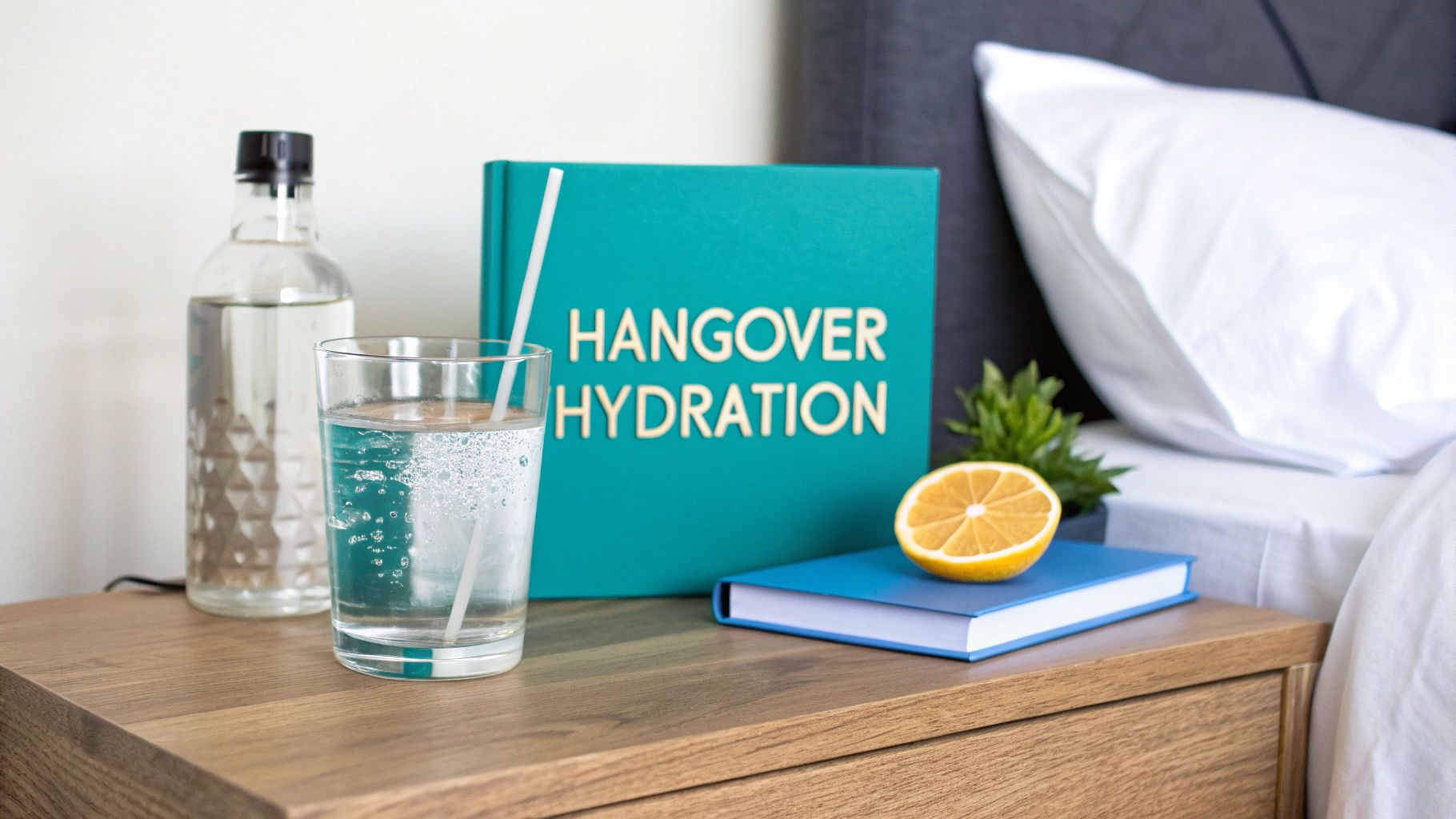

· By Annemarie
Your Guide to Hydration for Hangover Relief
We’ve all heard it a million times: a hangover is just your body screaming for water. While that’s definitely a big part of the story, the truth is a bit more complicated. If you've ever chugged a gallon of water and still felt awful, you know that focusing only on hydration just doesn't cut it.
Understanding what's really going on is the first step to building a smarter recovery plan that actually works.
Why Hangovers Are More Than Just Dehydration
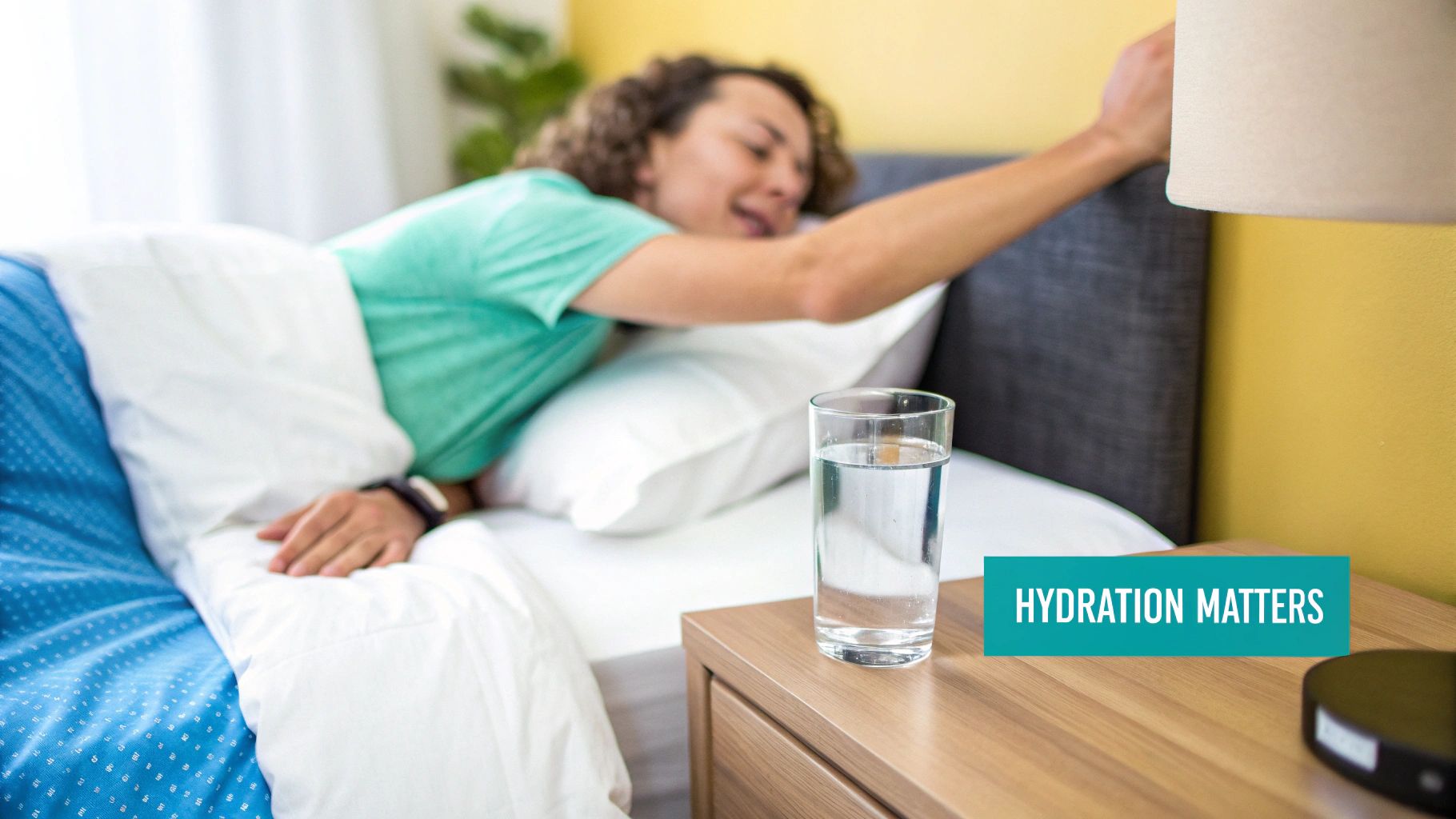
Waking up with a pounding head and a mouth as dry as the Sahara? Yeah, that feels like a classic sign of dehydration. For years, the go-to advice has been simple: drink water. And it’s true—alcohol is a diuretic, meaning it makes you pee out fluids and essential electrolytes. But that's just the opening act of a much bigger drama happening inside your body.
Gulping down water might take the edge off your headache, but it won’t do much for the lingering nausea, brain fog, or that general feeling of being run over by a truck. That’s because a hangover is a multi-front attack on your system.
The Role of Inflammation
Here’s something you might not know: when your body breaks down alcohol, it can trigger an inflammatory response from your immune system. This reaction is a huge contributor to that overall feeling of sickness and just feeling blah. Your body is basically treating the byproducts of your fun night out as a threat, leading to symptoms that feel a lot like being sick.
If you want to dive deeper into the science, you can learn more by checking out our guide on what causes hangovers.
Acetaldehyde: The Real Villain
As your liver gets to work processing alcohol, it produces a nasty, toxic compound called acetaldehyde. This stuff is way more toxic than alcohol itself and is a primary culprit behind many of your worst symptoms, like headaches and nausea. How you feel the next day often comes down to how quickly your body can clear this junk out.
This is exactly why your friend might feel fine after three drinks while you’re miserable after just one. It's often a simple matter of how efficiently their body metabolizes and gets rid of acetaldehyde.
The Myth of Dehydration as the Sole Cause
Thinking of a hangover as just a dehydration problem is an old-school, and frankly, outdated view. Newer science is starting to challenge this long-held belief. A recent study actually found that while people who drank more felt thirstier, dehydration and hangovers are separate issues caused by drinking. The takeaway? Simply rehydrating isn't the magic cure we once thought it was.
It's crucial to see the bigger picture. An effective hangover strategy has to tackle everything at once:
- Rehydration: Of course, you need to replace those lost fluids.
- Electrolyte Balance: You have to restore crucial minerals like sodium and potassium.
- Inflammatory Response: Calming down your immune system's overreaction is key.
- Metabolic Byproducts: You need to help your body process and eliminate toxins like acetaldehyde.
This is why a comprehensive approach—combining smart hydration with the right nutritional support—is your best bet for a faster, more complete recovery.
A Proactive Plan for Better Rehydration
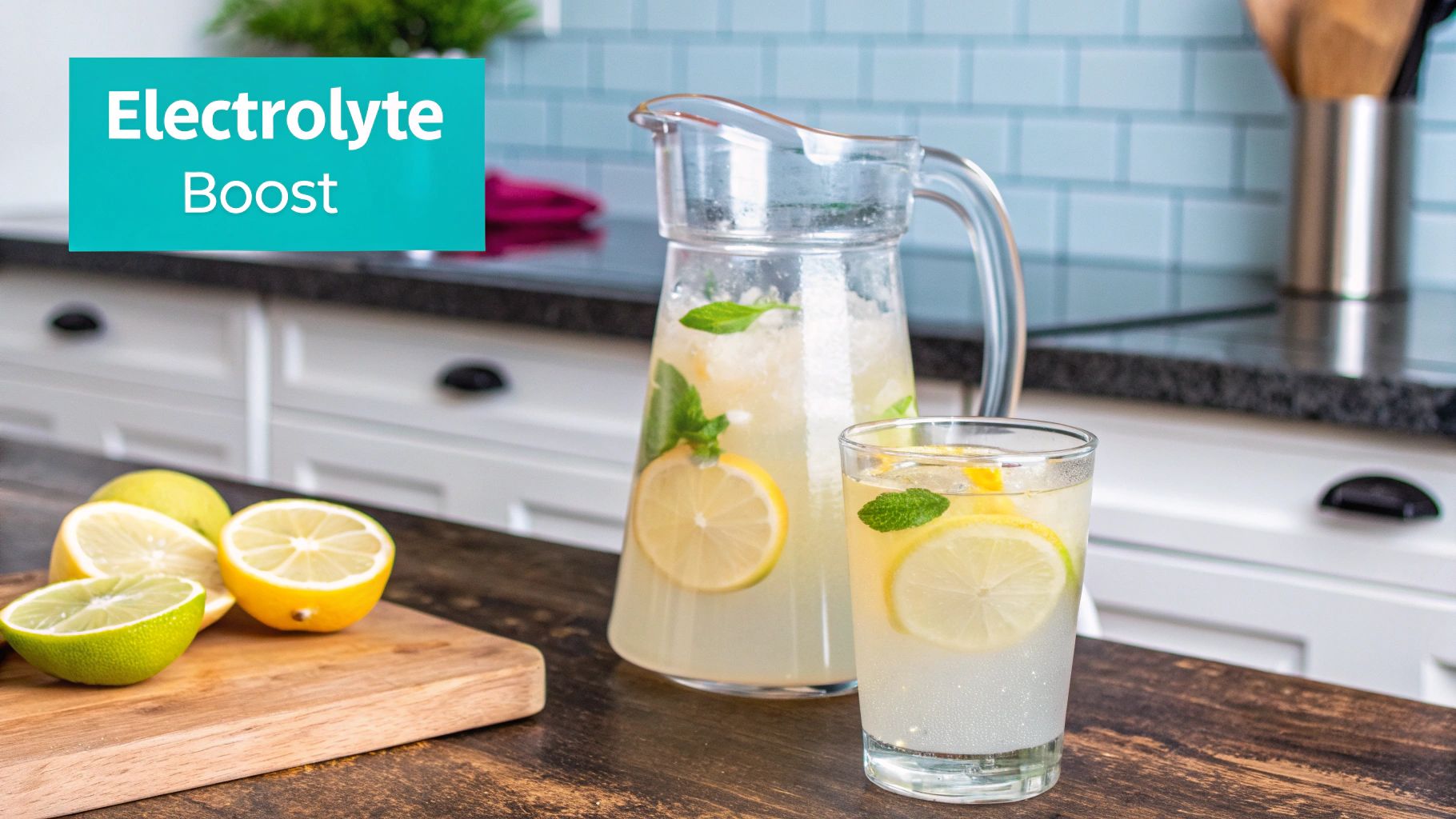
The best plan for bouncing back from a big night out starts way before you wake up with that pounding head. Honestly, if you wait until morning, you're already playing catch-up. You’re fighting an uphill battle against dehydration and mineral loss that’s been going on for hours.
A truly smart strategy is all about being proactive, not reactive. It's about shifting your mindset from "fixing" a hangover to stopping its worst effects from ever taking hold. You can get way ahead of the dehydration curve by making a conscious plan while you're still out.
Your Hydration Game Plan During the Night
The easiest rule to live by is the one-for-one method. For every alcoholic drink you have, follow it up with a full glass of water. It’s a simple habit that helps counteract alcohol's diuretic effect in real-time, slowing down how quickly you lose those precious fluids.
Think of it as keeping things in balance instead of letting your body fall into a deep fluid deficit. It’s a tiny adjustment that makes a massive difference in how you feel a few hours later.
To really step it up, make your very last drink of the night a non-alcoholic one focused on restoration. Before you even think about hitting the hay, get an electrolyte-rich beverage ready. This isn’t just about chugging plain water; it’s about strategically putting back the specific minerals your body is losing.
- Sodium: Absolutely crucial for fluid balance and nerve function.
- Potassium: Helps keep your muscle contractions and fluid levels in check.
- Magnesium: Involved in over 300 different enzyme reactions in the body, including energy production.
Alcohol actively flushes these vital electrolytes out of your system. Just drinking water without them is pretty inefficient because your body struggles to absorb and hold onto the fluid. A lot of that water just passes right through. You can dive deeper into the best way to rehydrate after drinking with proven science tips for all the details.
Reading Your Body’s Early Warning Signs
Your body starts sending out little smoke signals long before a full-blown hangover hits. Learning to recognize these early warnings lets you step in before things get out of hand.
Pay attention to those first signs, like a dry mouth, feeling extra thirsty, or just a bit foggy beyond what the alcohol is doing. These are your first clues that the dehydration process is officially underway. When you notice them, it’s a clear sign to make water and electrolytes your top priority, right then and there.
Your final "nightcap" should be your first line of defense. A pre-bed drink with water, electrolytes, and key vitamins gives your body the tools it needs to start recovering while you sleep.
This is where something convenient like Upside Hangover Sticks is a total game-changer. They’re designed to be that final, strategic step in your night. By mixing one into a glass of water before you turn in, you aren’t just hydrating—you're front-loading your system with the exact nutrients it needs for a better morning. It's a proactive move that can make all the difference in waking up feeling refreshed instead of completely wiped out.
Choosing Your Hangover Recovery Drink
We’ve all been there. Stumbling to the fridge with a pounding head, squinting into the blinding light as you try to make a decision. The beverage aisle at the convenience store can feel just as daunting. When you feel that rough, every choice feels monumental.
The right drink can genuinely start turning your day around, but the wrong one? It can make you feel even worse. It's a high-stakes game when you're already paying the price for last night.
Your first instinct is probably to grab some plain water, and that’s not wrong. It's essential. But after a night of drinking, your body hasn't just lost water—it's been stripped of vital electrolytes like sodium and potassium. That's a big reason why chugging plain water alone often feels like it isn’t really doing the trick.
This quick comparison shows how different drinks really stack up when it comes to rehydration.
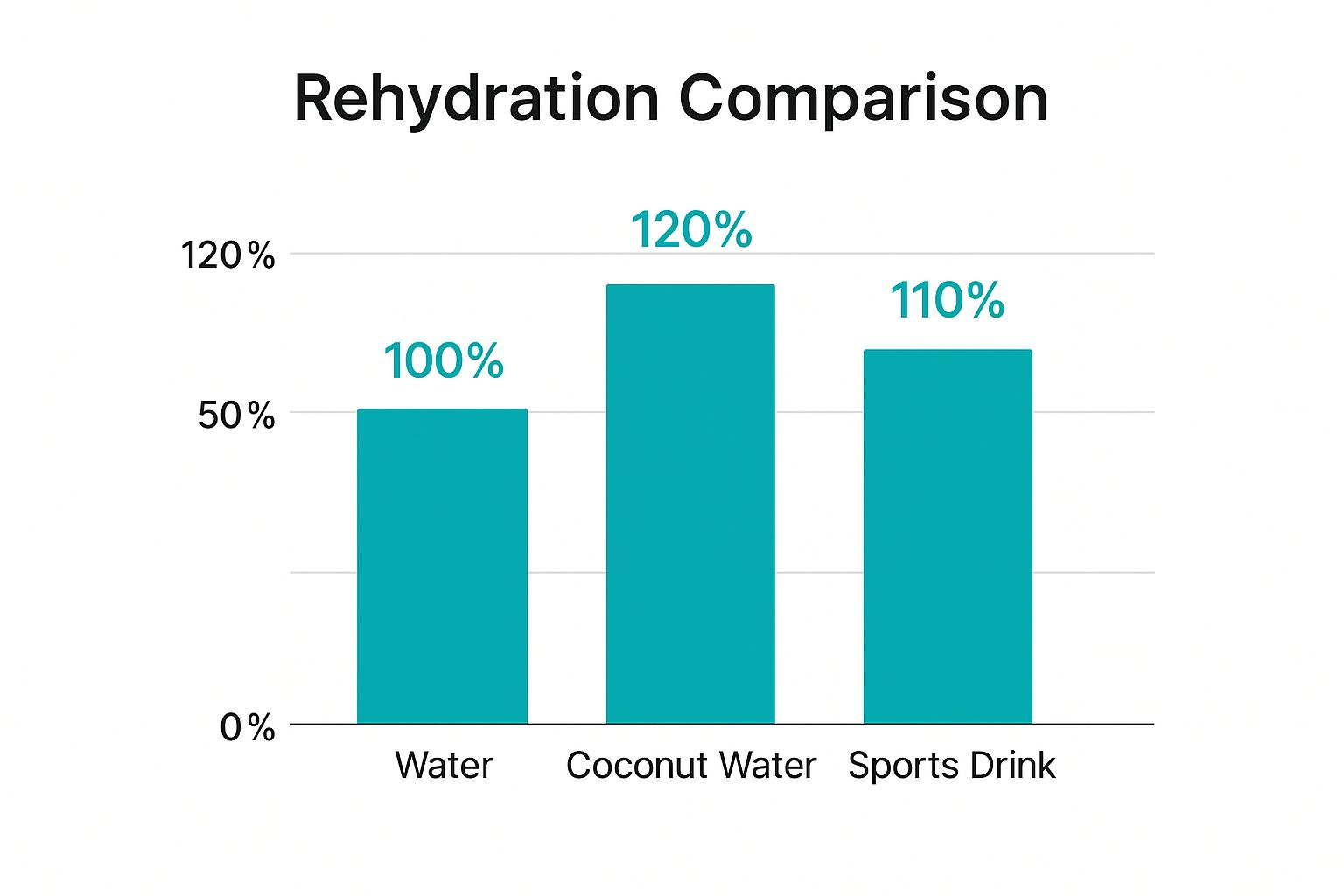
As you can see, the drinks that actually work best go beyond just H2O.
Beyond Plain Water
This is where other drinks try to step in. For years, people have reached for sports drinks. On the surface, it makes sense—they have fluids and electrolytes, which seem to check the right boxes.
The problem is, most sports drinks are designed for athletes sweating buckets during a workout, not for someone recovering from alcohol. The biggest issue is their high sugar content. A sugar crash on top of an existing hangover is a recipe for a truly miserable day. Trust me, always check the label for sugar content before you commit.
Coconut water is another popular go-to, often hailed as a natural wonder. It's a pretty solid choice because it’s naturally packed with potassium, a key electrolyte. The only catch is that it's low in sodium, which is just as important for getting your body’s fluid levels back in balance.
Comparing Hangover Hydration Options
Navigating the drink aisle when you're hungover can be a real challenge. You need something that will actually help, not just mask the symptoms or, worse, add to them. Here's a look at how common options compare when it comes to tackling that post-party dehydration.
| Beverage Type | Electrolyte Content | Sugar Content | Best For | Potential Downsides |
|---|---|---|---|---|
| Plain Water | None | None | Basic hydration, sipping throughout the day | Lacks electrolytes to restore balance quickly |
| Sports Drinks | Moderate | High | Post-workout recovery | The sugar can lead to a crash, making you feel worse |
| Coconut Water | High in Potassium | Moderate | A natural source of potassium | Low in sodium, which is also crucial for rehydration |
| Upside Sticks | High & Balanced | Low | Targeted hangover recovery | Not as widely available as other drinks (best to order online) |
| Coffee/Tea | None | Varies (often high) | A caffeine boost | Can be dehydrating; often comes with sugar or dairy |
| Soda | None | Very High | Satisfying a craving | No electrolytes, lots of sugar, can upset your stomach |
Ultimately, while many drinks offer some benefits, a formula specifically designed for hangovers, like Upside, provides the most targeted and complete support. It's about giving your body exactly what it needs to bounce back, without the extra sugar or missing nutrients.
The Problem with Most “Hydration” Drinks
The issue with so many off-the-shelf drinks is simple: they weren't made for the unique stress a hangover puts on your body. They might solve one piece of the puzzle, but they ignore the other critical parts.
Think about it this way:
- Plain Water: It’s crucial, but it doesn’t have the electrolytes your body needs to actually absorb and use the fluid effectively.
- Sports Drinks: They have some electrolytes, but they're often packed with sugar that can backfire and worsen your symptoms.
- Coconut Water: Great for potassium, but it’s missing the sodium required for complete rehydration.
True hydration for hangover relief isn't just about drinking fluids. It’s about restoring a specific balance of electrolytes, vitamins, and minerals that alcohol has depleted. A generic drink from the corner store just can't provide that kind of targeted support.
The Advantage of a Specialized Formula
This is exactly where dedicated hangover recovery drinks make all the difference. Products like Upside Hangover Sticks are engineered from the ground up to address the specific deficits caused by alcohol. They aren’t just trying to rehydrate you; they’re trying to restore you.
These formulas are carefully crafted to deliver a precise blend of electrolytes in the right ratios—sodium, potassium, and magnesium. They also usually include B vitamins to help your body process alcohol’s nasty byproducts and other ingredients to help with inflammation.
By choosing a drink specifically designed for hangover recovery, you’re giving your body a far more powerful and efficient tool. Instead of a generic fix that only gets you part of the way, you get a targeted solution that works faster and more effectively to help you get your day back.
Eating for Hydration and Recovery
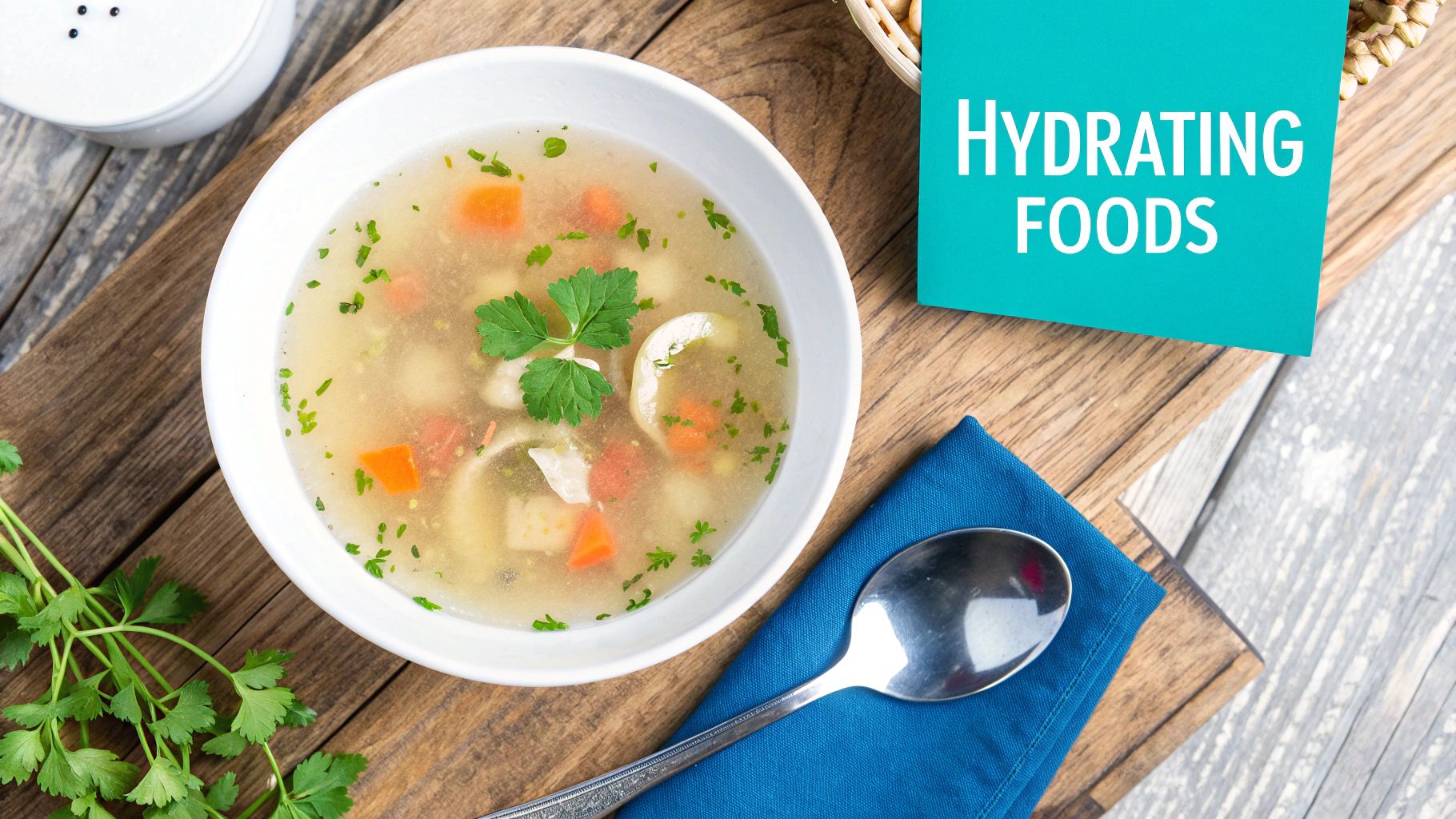
While chugging fluids is priority number one for hangover recovery, what you eat can be a total game-changer. The right foods don't just add to your hydration for hangover efforts; they also help restock lost nutrients and calm down an angry, irritated system.
Think of food as another weapon in your rehydration arsenal. A lot of common fruits and veggies have surprisingly high water content, making them a tasty way to supplement all the water you're already sipping.
Foods That Double as Hydration Helpers
You probably have some seriously hydrating foods sitting in your kitchen right now. They're effective because they’re packed with water and the essential vitamins and minerals that a night of drinking strips away.
Here are a few easy-to-grab options:
- Watermelon and Cantaloupe: These melons are over 90% water. Plus, they give you a little boost of natural sugar for some gentle energy.
- Cucumbers: They're basically water in solid form. Super easy on the stomach and incredibly refreshing.
- Oranges and Strawberries: Besides being full of water, they’re loaded with Vitamin C, a powerful antioxidant that helps your body deal with the inflammatory mess alcohol leaves behind.
Snacking on these throughout the day can seriously boost your fluid levels without you having to constantly refill your water bottle.
Gentle Meals to Settle Your Stomach
Let’s be real, when you're feeling nauseous, a five-course meal is the last thing on your mind. The trick is to pick foods that are bland, nutrient-rich, and won't make your stomach do backflips.
A simple, warm bowl of chicken broth soup is a classic for good reason—it delivers fluids, sodium, and electrolytes in a way that’s just plain comforting. Bananas are another fantastic choice, famous for their high potassium content, which is a key electrolyte you lose when you drink. For more great ideas, check out our list of hangover helpers and what to eat after a night of drinking.
The old advice to eat a "greasy breakfast" is a stubborn myth that usually makes things worse. A heavy, fatty meal can completely overwhelm your already stressed-out digestive system, cranking up nausea and indigestion.
So instead of a greasy plate of bacon and fried eggs, go for something lighter. A piece of toast with some avocado or a couple of scrambled eggs gives you a nice mix of carbs, healthy fats, and protein without starting a heavyweight fight in your stomach. Your body needs fuel to recover, not another battle to fight.
The Booming Market for Hangover Cures
If you've ever woken up after a few drinks frantically searching for something—anything—to make the next day less miserable, you're definitely not alone. The quest for effective hydration for hangover relief isn't just a quiet morning-after ritual anymore. It’s exploded into a full-blown cultural and economic movement.
An entire industry has popped up around one simple, universal desire: to get our day back after a night of fun.
And this isn't some tiny, niche market. We're talking about a global phenomenon. The demand for products that actually help you recover has created a market valued at around $2.55 billion. And it’s not slowing down. Experts are predicting it’ll grow by 12.0% every year between 2025 and 2030.
This boom makes perfect sense when you look at the bigger picture. Global alcohol consumption is on the rise, expected to climb from 5.9 liters per person back in 1990 to an estimated 7.6 liters by 2030. You can dive deeper into these trends in the full Grand View Research report.
The Rise of the Productivity-Focused Drinker
So, what's really driving this incredible growth? A huge piece of the puzzle is a total mindset shift, especially with younger people and busy professionals. The old way of thinking—just accepting a wasted day glued to the couch—is completely over.
In today's world, where we're all about wellness and getting things done, people are actively looking for ways to have a great social life and still crush their goals.
This modern drinker wants to have their cake and eat it too. They want the fun night out with friends, but they also need the focus to be on their A-game the next day. A hangover isn't just a minor annoyance; it's a direct threat to their productivity and well-being. This has created the perfect storm for products offering a quick, science-backed solution.
A hangover is no longer viewed as a badge of honor or an unavoidable consequence. Instead, it’s seen as a problem to be solved efficiently, just like any other obstacle standing in the way of a productive day.
Why Smart Consumers Are Looking for More
People are getting way smarter about what their bodies actually need to recover. They get that chugging plain water isn't the whole story and are seeking out targeted formulas that do more. This savvier consumer is pushing the demand for products that deliver on a few key things:
- Convenience: Easy, on-the-go solutions that fit into a packed schedule. No one has time for complicated routines.
- Efficacy: Proven ingredients that tackle the root causes of a hangover—not just mask the symptoms.
- Clean Labels: Natural ingredients without a bunch of unnecessary sugar or artificial junk.
This booming market isn't just about selling a "quick fix." It's about offering a tool that helps you optimize your life. It's why products like Upside Hangover Sticks have found their audience. They directly meet this need with a scientifically formulated, super convenient, and effective way to support your body's recovery.
So, your search for a better way to bounce back isn't just you. It's part of a much larger movement toward taking control of your health and making sure nothing gets in the way of your productivity.
Hangover Hydration Questions We Hear All the Time
When you're feeling the effects of a big night out, the last thing you need is conflicting advice. You just want straight answers that work. So, let's cut through the noise and bust some common myths about hangover hydration. Think of this as your personal cheat sheet for getting back on your feet, fast.
How Much Water Should I Actually Be Drinking?
There's no single magic number here. The real key is consistency over sheer volume. Guzzling a gallon of water the second you wake up might seem like a good idea, but it can just overwhelm your system and pass right through you without doing much good. A much better strategy is to sip water steadily all day long.
So, what should you aim for? Around 8-10 glasses is a solid target, but honestly, your body is the best guide. Just pay attention to a couple of key signals:
- Thirst: If you're feeling thirsty, you’re already in dehydration territory. Time to start sipping.
- Urine Color: You’re looking for a pale, straw-yellow color. If it's dark yellow, that’s a clear sign you need to up your fluid intake.
Here's the most important takeaway: always pair your water with an electrolyte source. Electrolytes like sodium and potassium are what help your body actually absorb and hang onto the water you're drinking. Without them, your efforts won't be nearly as effective.
Are Sports Drinks a Good Move for Hangovers?
They can work in a pinch, but they are far from your best bet. Most of the big-name sports drinks are designed to replace what athletes lose through sweat, which is a totally different chemical mix than what your body loses from processing alcohol.
The biggest issue is their sugar content. A lot of them are loaded with it, and a sugar crash on top of an already brutal hangover is a recipe for feeling even worse. While they do offer some electrolytes, you're much better off with a product made specifically for hangover recovery. It's formulated to handle the unique stress a hangover puts on your body, not just simple athletic dehydration.
Will Coffee or "Hair of the Dog" Really Help Me?
This is where some of the most popular—and unhelpful—myths live. Unfortunately, both of these can actively make your situation worse.
Coffee gives you that temporary caffeine lift, sure, but it's also a diuretic. That means it can actually make you more dehydrated, which will only drag out your misery in the long run.
And "hair of the dog"? Even worse. Drinking more alcohol does absolutely nothing to rehydrate you. It's just a delay tactic. Your body still has to process all that new alcohol, which often just leads to a nastier, longer-lasting hangover later. For true hydration for hangover relief, stick to drinks that are non-alcoholic and non-caffeinated.
When’s the Best Time to Start Rehydrating?
The most effective time to fight a hangover isn't the morning after—it's before you even hit the pillow. Being proactive makes a night-and-day difference. A simple rule of thumb is to drink a glass of water for every alcoholic drink you have throughout the night.
But the real pro move is to make your last drink of the night a big glass of water, preferably mixed with an electrolyte formula. This strategy front-loads your system with the fluids and minerals it's about to lose, making it way more effective than trying to play catch-up when you wake up already in a deficit.
Ready to stop playing catch-up with your hangovers? Upside Hangover Sticks are your proactive solution. They’re scientifically formulated with the electrolytes and vitamins your body needs to recover, all in a convenient, easy-to-take jelly. Just take one before bed and wake up feeling refreshed. Try it for yourself and feel the difference at https://enjoyupside.com.
